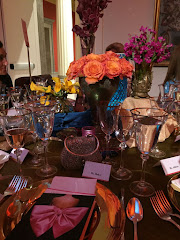As a teenager, how many times did you hear the expression: "As long as you live under our roof, you must abide by our rules." As an adult, you may say to yourself: "Life is what we make it." In the Science Fiction book and movie: "The Hunger Games," we hear the citizens in this post-apocalyptic society repeating in unison, Gandhi's quote: "You be the change you want to see in the world."
My 12 year old grand-daughter's favorite part of the book was the heroine's ability to live and survive in the woods, hunting her own food with bow and arrow and knowing which berries, nuts, mushrooms and leaves to eat and which were poisonous. In our book club, we discussed why 30 million copies of this youth book were sold and decided teens liked this story for its protagonist, Katniss Everdeen. We follow alongside Katniss in this topical thriller, witness to her transformation from a strong, self-sufficient teenager just wanting to survive the 'Games', to a virtuous, giving woman, willing to sacrifice her own life for the life of another.
The story unveils the vices of the government worshiping, game playing, game makers: the citizens of District I. The Capitol, called Panem, after the Latin for 'bread' is supposed to be equal to the other 11 Districts, but clearly it is not. In any equal society, someone has to run it, right? Panem's circus-like citizens look like Lilly Pulitzer gone wild in South Beach. These corrupt citizens unknowingly live out the Hellish Seven Deadly Sins in an Orwellian style, Godless, grand scale Reality TV world. The citizens are rich, and sumptuous buffets of food are always present, yet wasted. These privileged government workers are thin because they are so vein, unlike in the other 11 Districts where food is scarce. Government rations are available, but for a price...your life. Every time you take a government ration of food to feed your family and oil to heat your house, your name is entered into the lottery for another chance to be forced into participation as a "Tribute" for "The Hunger Games." Meanwhile, the pampered citizens of Panem are are overdone on plastic surgery, narcissistic, gluttonous in their appetite for greed, wrathful, envious, and brutally shallow craving constant entertainment.
The President of the 12 Districts, is dignified, charismatic, and TV ready, yet underneath the surface, is a hypocrite, cruel and divisive. Divide and conquer. He says he shows his citizens a little bit of hope by requiring the 'Games" be viewed by every citizen, but thinks too much hope is dangerous. He sounds like Lenin who referred to his citizens as: "Useful idiots." Too much hope may lead to another uprising against the government and undermine their total control. Those in the Capitol, need the plentiful natural resources of the other 11 dirt poor districts to live their luxurious lives, so control is crucial to their survival.
This adventure story shows the physiological 'fight or flight' stress reaction. It delves deep into the woods where wild animals are hunted, whether they be man or beast. It explores hatred for those one does not know, hatred for those in the know, and hatred for the government.
On a different level, this tale tells a tender story of sacrifice, unrequited love, a love of family and friends, and an acceptance of self.
In our book club discussion, the subject of why suicide never occurred to any one teen as they struggled for survival during the 'Games' was raised. The conclusion was that there was not enough hope and no faith in any type of afterlife within this secular society. The greatest sin was any sin against the all mighty government. A government that cradled you and initially meant to take care of you from birth to death. Ironically, 74 years later, it controlled uncontrollable things like the weather, the sunrise, and the stars.
The Capitol district, called Panem, or the Latin for "bread," sacrifice one boy and girl called "Careers" each year for the games. One of these "Careers" usually win as they each train their entire lives for what they call "their honor" to compete. Like a corporate culture, they all drink the Capitol Kool-aid and eat their cake. These sinful citizens of the capital with their fancy fashion and expensive plastic surgery, look like they should be contestants in their own Reality TV show.
Ironically, it will be one virtuous boy and girl from the other 11 Districts who will be chosen in a lottery and forced to be the real players of "The Hunger Games." This 74th annual competition, a fight to the death, was conceived by the government and serves as punishment for a past rebellion. It also serves as a reminder the government is in control.
Throughout this moving story, we hear different characters repeating what becomes a familiar line stated annually by a game official: "May the odds be ever in your favour", as though luck is even an option in any government controlled decision about your life. Unlike Reality TV, the ultimate dirty little secret of any "equal" society totally controlled and ultimately corrupted by any one entity ends up eventually to resemble the familiar Darwinian philosophy: "Live and let live."











